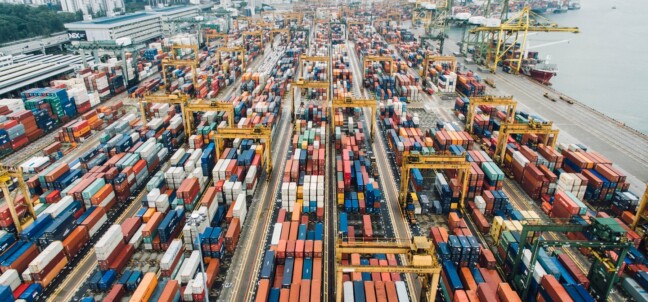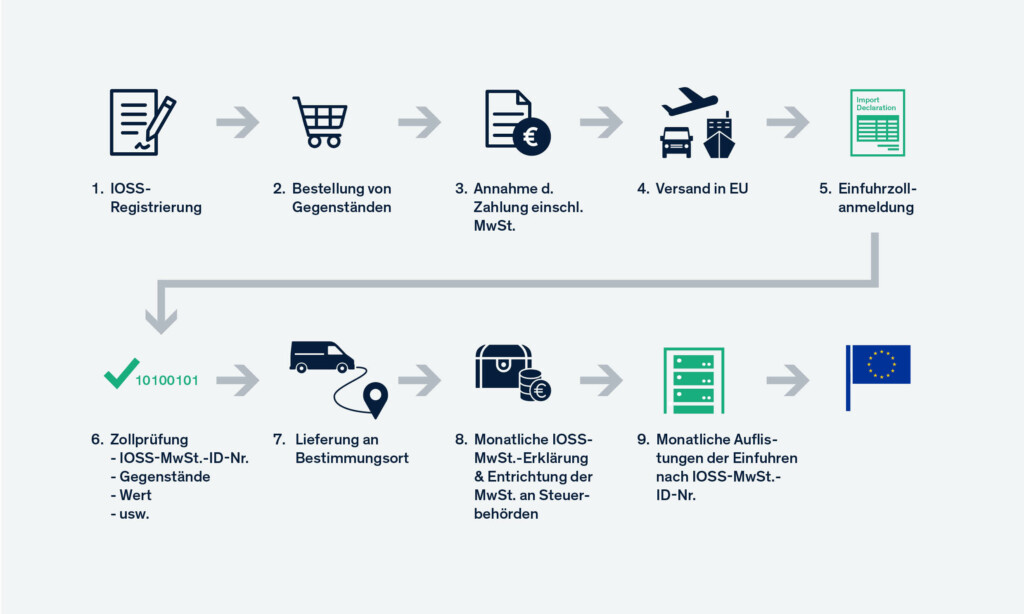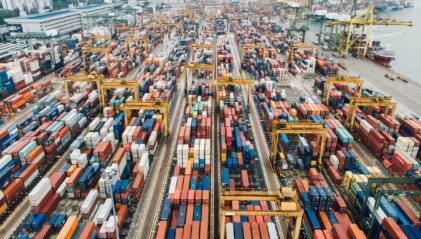The implementation of the Import-One-Stop-Shop
As of 1 July 2021, various new rules on VAT apply in the European Union. For e-commerce merchants and online marketplaces, the newly introduced Import-One-Stop-Shop (IOSS) VAT system is essential. The IOSS special regulation can be used by online merchants and portals that import goods from non-EU countries with a low real value. Tax advisors consider the new VAT regulations when advising and assisting their clients.
What does “IOSS” mean?
The IOSS procedure is a special VAT regulation applicable throughout the EU since 1 July 2021 for “distance sales” of goods traded in e-commerce.
- with a real value of up to 150 euros,
- which are imported from a non-EU country (“third country”) and are
- sold to non-VAT-registered purchasers (both natural and legal persons).
The IOSS special procedure allows online merchants to submit the sales covered by the IOSS system in a single tax return to a central office (in Germany, the Federal Central Tax Office, BZSt). The IOSS regulation applies in all EU member states. Each EU member state establishes a “one-stop-shop” for imports, the Import-One-Stop-Shop, IOSS.
In Germany, the IOSS is run as an online portal of the Federal Central Tax Office. The online portal of the BZSt, which is used not only as IOSS but also for other tax purposes, bears the abbreviated designation BOP. Businesses participating in the IOSS special scheme are exempt from import VAT regarding the transactions eligible for IOSS (§ 5 paragraph 1 number 7 UStG).
To participate in the IOSS procedure throughout the EU, the IOSS registration of an online merchant or an “interface” (online platform or online portal) in only one of the EU member states is sufficient.
What legislation governs the IOSS process?
Articles 369l to 369x of the VAT System Directive 2006/112/EC (VATSystRL) contain the IOSS regulations applicable throughout the EU. The provisions of the EU VATystD were integrated into the German VAT Act with effect from 1 July 2021 (in particular § 3 paragraph 3a, § 18k, § 22f and § 25e UStG).
Elimination of competition distortions for imported goods up to 22 euros
According to the VAT law applicable in the EU until June 2021, commercial goods imported from outside the EU were exempt from import VAT up to a value of 22 euros (exemption limit). In contrast, there was no exemption limit for goods deliveries transacted within the EU. When trading within the EU, turnover tax was also levied on goods with a low real value.
The resulting distortion of competition between trade in goods within the EU and imports from outside the EU was eliminated by the new e-commerce VAT rules as of 1 July 2021. VAT is now levied on all trade goods imported from non-EU states – regardless of the real value of the imported products. The previous preferential VAT treatment for goods imported from non-EU countries with a value of up to 22 euros will be abolished. In addition, the electronic customs declarations practised for postal traffic within the framework of IOSS as of 1 July 2021 are expected to reduce the previous extent of false declarations of the real value of postal consignments.
Changes by IOSS for goods with a real value above 22 euros and up to 150 euros
For products worth more than 22 euros, buyers were previously forced to pay VAT when importing the goods. The IOSS procedure now allows online merchants and interfaces to collect VAT on imported goods, make the tax declaration themselves and make the VAT payment to the tax authorities.
What happens to distance sales within the IOSS VAT regulation?
The previously used term “mail-order” received the title “distance selling” with the implementation of the so-called VAT digital package. The second stage of the digital package adopted with the Annual Tax Act 2020 (JStG) included the introduction of IOSS as of 1 July 2021.

Distance sales
For the IOSS special VAT regulation, distance sales are defined in Article 14(4)(2) of the VAT System Directive 2006/112/EC (VAT Directive) as
- supplies of goods (imports) from non-EU countries (“third countries”) to the European Union,
- if the delivery of goods is made to private individuals or legal entities not liable to pay VAT
- including those taxable persons to whom a derogation (Article 3(1) VAT Directive) from a VAT obligation that exists in principle (Article 2 VAT Directive) applies.
Exceptions: the delivery of which products does not fall under the concept of distance selling?
For the IOSS regulation, the following items are not considered to be distance sales:
- new vehicles supplied, and
- goods assembled or installed by (or on behalf of) the supplier.
(Article 14(4)(2)(b) VAT Directive)
Supply chain fiction: inclusion of online marketplaces in the IOSS regulation
An electronic interface is defined as an “electronic marketplace, electronic platform, electronic portal or similar” (§§ 3(3a) sentence 3, 25e(4) UStG).
A “supply chain fiction” now applies if goods are sold via an online marketplace (“online interface”). When an online portal is included in the sale of goods, a chain transaction is legally fictitious, and the “online interface” is included in the supply chain (§ 3 paragraph 3a sentences 1 and 2 UStG). According to Section 25e (1) UStG, the operator of an electronic interface that assists in the supply of goods, is liable if the online merchant fails to pay the VAT due on the sale.
Thus, online platforms and marketplaces are included in the VAT IOSS obligations about goods traded by online merchants via internet platforms.
To which business operators do the legal standards on the IOSS apply?
The IOSS regulation applies to the following businesses:
- Online mail order sellers (online distance sellers) sell goods imported from a non-EU country with a real value of up to €150 per consignment to buyers within the EU who are not subject to VAT.
- Online marketplaces (“electronic interfaces”) assist an online distance seller in selling goods imported from outside the EU.
How the IOSS works

Source: https://www.zoll.de/DE/Unternehmen/Warenverkehr/Postsendungen-Internetbestellungen/Neuerungen-eCommerce/neuerungen-ecommerce_node.html
IOSS limit 150 euros: How is the real value of a good determined?
The real value is the selling price of a good when the good is exported to the European Union, excluding transport and insurance costs (unless these are included in the price) and taxes and duties.
The IOSS limit of 150 euros applies to each individual consignment of goods
As a rule, each individual package is deemed to be a consignment of goods to which the IOSS upper limit of 150 euros applies. When delivering several items, a single delivery is deemed to exist if,
- several items are delivered together in one package,
- the delivery is made based on a single contract of carriage,
- the dispatch of all items is made by the same consignor and to the same consignee.
A single consignment is also accepted if
- the same person has ordered several items,
- but are delivered in one package.
On the other hand, separate consignments are to be assumed if
- the same consignor sends several items to the same consignee,
- but are ordered and delivered separately.
A separate delivery is also deemed to exist if,
- although the consignor and consignee of several items are identical
- reach the courier service provider at the destination on the same day, but in separate packages.
Note: VAT regulation liberated of customs collection
For consignments with a real value of a maximum of 150 euros (exemption limit for private individuals and commercial recipients), duty-free treatment continues to apply. However, alcohol, tobacco and perfumes, among others, are excluded from this exemption.
Businesses with which registered office can use IOSS?
The use of the IOSS is open to the following businesses:
- merchants established in Germany,
- merchants established in another EU state if they have appointed a representative with a domestic registered office (such representation must be notified to the Federal Central Tax Office),
- merchants not established in the EU if an agreement on mutual administrative assistance has been concluded between the EU and the third country concerned (this currently only applies to Norway),
- merchants not established in the EU if they have appointed a representative with a domestic registered office and this representation has been notified to the BZSt.
What exactly is a “representative” within the meaning of the IOSS regulations?
In Germany, a “representative” (also called a fiscal representative) within the meaning of the IOSS Special Regulation is deemed to be
- a person with a domestic place of business
- who is appointed by the trader making distance sales of goods imported from a third country,
- as the person liable to pay tax (§ 13a UStG) and
- to fulfil the obligations under the IOSS regulation
- in the name and on behalf of the merchant
is appointed.
(see Sales Tax Application Decree of the Federal Ministry of Finance (UStAE) 2010 on § 18k UStG, paragraph 10).
Is there an obligation for online merchants and interfaces to use the IOSS?
No, online merchants and interfaces are not obliged to use the IOSS. Online merchants and interfaces can choose whether they want to register for the IOSS system in a single EU state and fulfil their EU-wide VAT obligations via this IOSS registration. If they decide to participate in the IOSS system, it applies uniformly to all EU Member States.
Suppose a merchant decides not to participate in the IOSS system. In that case, he must register individually in all EU Member States. He concludes transactions subject to VAT. Under this optional special arrangement, the import VAT is collected from the consignees by the transport company (e.g., courier service provider). The carriers pay the retained VAT amounts to the customs administration the following month.
Registration as a requirement for participation in the IOSS procedure
Businesses wishing to participate in the IOSS taxation system must register in Germany with the Import-One-Stop-Shop of the Federal Tax Office. Once online registration has been completed, the registering business will receive information “within approximately two to fourteen working days” about the processing that has taken place. In addition, the new IOSS participant will be given a registration number (identification number).
The IOSS procedure can be used from the calendar day the online merchant or his representative is notified of the registration number. The merchant can revoke his participation in the IOSS special scheme by observing a 15-day revocation period at the beginning of the following month.
The registration and the use of the IOSS VAT procedure, changes to the registration data and any subsequent deregistration from the IOSS procedure are carried out exclusively online via the BZSt online portal (BOP).
IOSS procedure: Tax return and assessment
Merchants participating in the IOSS procedure must submit a VAT return via the BZSt online portal every month – even if no sales subject to IOSS were generated within a month.
The tax return must contain the following information:
- Identification number
- Taxable period
- Total IOSS-relevant turnover
- Tax rate and VAT type (reduced or standard VAT)
- Tax amount and total tax liability (automated determination in each case)
- corrections to previous tax periods, if applicable
The deadline for submitting the tax return is the end of the month following the tax period (Article 369s VAT Directive).
When using IOSS, VAT is determined via a tax return sent to the tax administration, no longer via a customs declaration. IOSS participants can no longer claim a tax refund from customs; input tax can consequently no longer be claimed. The tax authorities must receive payment of the VAT due by the end of the month following the month of taxation. The participating merchant must make payment by bank transfer, as direct debit is not provided.
Relevance of the IOSS for deliveries of goods to small entrepreneurs not subject to VAT
The EU Member States may exempt small businesses from paying VAT (Article 2 VAT Directive) within the turnover limits specified in Article 284 VAT Directive. The Federal Republic of Germany has used this regulatory option in § 19 paragraph 1 of the Value Added Tax Act (UStG). In Germany, a small business is defined as a business whose turnover in the previous calendar year,
- did not exceed 22,000 euros in the previous calendar year and
- is not expected to exceed 50,000 euros in the current calendar year.
Deliveries to small businesses from outside the EU thus generally fulfil the requirement for inclusion in the IOSS procedure – unless the small business has waived its exemption from VAT (§ 19 paragraph 2 UStG).
Conclusion: Advantages and disadvantages of the IOSS special VAT regulation
Benefits of the IOSS Special Scheme
- The IOSS procedure for low-value goods facilitates and simplifies the VAT declaration and tax payment. All that is required is registration with an IOSS of one of the EU member states to declare all sales within the EU covered by the IOSS procedure for VAT purposes.
- The abolition of the previous VAT exemption limit for imports from non-EU countries prevents distortions of competition.
- The online procedure via the IOSS maintained at the Federal Central Tax Office makes false declarations of the tangible assets of consignments more difficult.
- Online merchants registered with an IOSS declare their distance sales covered by the special regulation in a simplified customs declaration.
- Furthermore, the IOSS system is optional for e-commerce merchants. Alternatively, merchants can register in each EU Member State to comply with their VAT obligations.
Disadvantages resulting from the IOSS procedure
- Taxable persons using the IOSS special regulation are required under Article 369x of the VAT Directive 2006/112/EC,
- to keep records of the underlying transactions and to
- make them available electronically to the competent authorities on request.
- Interface operators are also subject to extensive record-keeping obligations regarding deliveries that an online merchant processes via the operator’s internet portal (§ 22f UStG).
- The internet marketplaces affected by the IOSS regulations will be subject to additional liability obligations for VAT not correctly paid by the online merchant from 1 July 2021 (§ 25e UStG).
- The basis for this liability obligation is the legal construction of a chain transaction (supply chain fiction).
Do you want to streamline your import of goods into the EU? Get in touch.
Let’s stay in touch!
Stay up-to-date on the latest market trends, best practices and regulatory changes affecting cross-border selling by following us on LinkedIn.





